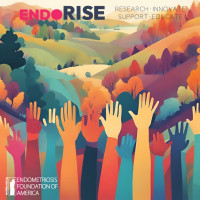As I sit down to compile my laundry list of thoughts racing through my mind regarding endometriosis, one stands out the most: stop the shame cycle. When I think of sharing this story it is with advocacy and education in mind. If my story can help one person be an advocate for themselves, then it is worth my while to share.
I have a daughter and I write this in part for her and also for any other person who second guesses or downplays their symptoms. I cannot emphasize enough the importance of education when it comes to all things reproductive health. As a parent, there will be instances where you are unable to relate to what your child may be experiencing. The most important part is to understand what is baseline “normal” and what is not.
When I started my period at 13, we were on a ten-hour road trip and I was mortified to discover that not only had my period started but there was also a tremendous amount of blood. Having period pain is often considered a rite of passage—I beg to differ. I believe that if you are having pain, especially excruciating pain, you need to trust your body and discover a root cause. My mom prepared me for my first menstrual cycle by simply saying that it would be “a little bit of blood.”
I spent the next few months in excruciating pain during my period. I would want to pass out from the pain and my mom could not fathom what the solution could be. My mom was baffled by this turn of events and took me to a gynecologist. At the young age of 13, I had no idea what was happening. I had an ultrasound that revealed a large cyst and was promptly placed on birth control. Without asking any questions, I remained on birth control until I was 32. In this time I suffered from a multitude of symptoms: cysts on my ovaries that would send me to the hospital or doctor, IBS, bloating, and pelvic pain. I was even hospitalized twice for a “spontaneous” stricture on my ureter, causing a 90% blockage in my kidney.
All the while, I never could have imagined that all of these things could be related. When I finally decided to transition off the birth control pill, I was developing some melasma on my face and thought that I would be fine to manage symptoms without it. My periods slowly became worse and worse. The amount of blood was unbelievable; I was anemic or borderline anemic all the time. I planned trips around my cycle to avoid the pain and embarrassment of how badly I felt.
The thing I remember most during this entire process was absolute mortification. Gone were the days of light flow and a little cramping. I could hardly manage the pain that I felt. I was bleeding through maximum absorbency tampons every two hours. I had to wake up several times in the middle of the night to change tampons or else I would bleed through.
The amount of anxiety leading up to my period was terrible. I knew that I would be up throughout the night, every night for 5-7 days to make sure I could manage the blood flow. I had a daughter at 35. I could not imagine that things would get worse, but I was completely wrong.
About eight months after my C-Section, I was in debilitating pain. My periods became even worse than they were before, I had pain during intercourse, and the quality of my life seemed to change before my eyes. I thought I was a pro at handling my pain, hiding my pain, not talking about my pain, but I could no longer keep quiet.
By month eight postpartum, I cried every month during my period. The pain was beyond belief. I will never forget being at a work meeting with a colleague. I was wearing a dress that day and even though I had just changed a tampon prior to the hour-long meeting, when I stood up, blood poured down my legs. I suffered through this for an entire extra year. I finally told my OBGYN I was ready for the scope she had suggested.
You see, pain is relative to the person experiencing it. Although there is a pain scale you can measure it by, it’s hard to know what is “normal” when all you have ever experienced is pain. I wish I had known how not normal it is to experience the kind of pain I was in. I wish that I had grown up in an era in which normalizing your body and all that it can experience was the norm. It is why I feel compelled to write this now. I want to be a part of the conversation that drives people to take a second look at what is happening in and to their bodies and to have the courage to speak up when it doesn’t feel right.
I complained to my family prior to my scope, “this is likely going to be a waste of time.” And, “Maybe this is just normal.” The only way to definitively diagnose endometriosis is through surgical evaluation. I was scared it was all in my head and maybe I just wasn’t tough enough to handle what my periods were like. When my OBGYN went in, they found that I had endometriosis, thickened endometrium, filmy adhesions of the uterus to the anterior abdominal wall, adhesions of the omentum to the uterus, and the fallopian tubes to the pelvic sidewall.
It Was Real. It was real. I needed surgery to validate my thoughts, my feelings, and my experience. It was finally real. The moment my eyes opened from the surgery I could feel the difference in my abdomen. It is true; I was in discomfort from surgical pain, but I could tell that there wasn’t the tugging and pulling that I had previously experienced and some of the discomfort was gone, at least for a little while.
About a year after my surgery my periods were back in full force. The clots, the bleeding, and the cramping was at an all-time high. On average, I was in pain for over 12 days per month. My pain started with ovulation and didn’t end until the last day of my period. My anxiety to try and navigate this was at an all time high. I had thought about, and discussed, a hysterectomy as an option for a very long time. Two months ago, I went ahead and scheduled a hysterectomy. I am in my 40’s and knew that I did not want to carry any more children.
While this may not be the solution for every case, it was the option that I chose based on my season of life. Seeking advice from a trusted healthcare professional is non-negotiable. On average it can take up to 10 years to diagnose endometriosis. Empowering yourself with knowledge and understanding of how the reproductive system works, how our whole body works, is so important.
I now work in the field of infertility/fertility and am astounded daily at how little education is offered until well into our 30s and 40s about the human reproductive system. How much shame, grief, pain, and confusion that people suffer through every single day.
If your car started making a weird noise, and you saw smoke coming from the engine, how long would it take you to have it looked at? We are given one body in this life. It is crucial that our young people grow up in a world where it’s normal to talk about bodily functions, to know their family history, and to be encouraged and supported through life changes like puberty so that they know what to expect, so they know what is normal, and that they have the resources they need when something doesn't feel right.
If I had a message to a young person it would be this: if you are having pain associated with your menstrual cycle, it is important to see your OBGYN—even if you are not sexually active. You deserve to be taken seriously. How you feel matters, and if something doesn't feel right, trust your intuition and what your body is showing or “telling” you. It is ok to seek out a second opinion.
It is important to find a physician that you can trust and one that takes your concerns seriously. Pushing your symptoms aside or putting off going to the doctor is not going to make your pain go away. In fact, not addressing your symptoms can not only compromise your personal well-being but could also compromise fertility down the road. There is so much power in being your own advocate. Keep a journal of your symptoms, write down your questions, and bring a trusted adult to your appointment. You matter, and so does your reproductive health; there are treatment options available and you don’t have to suffer in silence.
Jennifer Bush is a marketing professional in the healthcare space. She is passionate about using her voice to encourage empathy and awareness surrounding: global health, reproductive health, and mental health. It took over 15 years for her to obtain a definitive diagnosis with endometriosis. She shares her story with the hope that she can inspire others to listen to their body and never give up in seeking answers if something doesn’t feel right.
Editor's note: Would you like to contribute to EndoStories? Click here to learn how to submit your work.
*Patient stories submitted to EndoFound.org are the views of the patient and not necessarily those of the foundation. All testimonials are from real patients, and may not reflect the typical patient’s experience, and are not intended to represent or guarantee that anyone will achieve the same or similar results.









